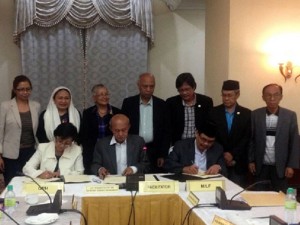
FILE PHOTO
MANILA, Philippines — The government and the Moro Islamic Liberation began on Wednesday what could be the final round of negotiations between the two panels if they come of to an agreement on the last annex that would make up a comprehensive peace agreement ending decades of warfare in Central Mindanao.
On the table of the 43rd round of talks in Kuala Lumpur, Malaysia, is the normalization annex, the last of the four annexes that would make up the final peace agreement between the government and the MILF.
The normalization annex deals with the overall security in the new Bangsamoro that would replace the Autonomous Region in Muslim Mindanao and the timeframe and manner by which the Moro rebels are expected to lay down their arms.
The peace agreement with the MILF is one of the cornerstones of the Aquino administration, and the Moro rebels themselves have said they want a peace deal before President Aquino completes his term in June 2016.
“It is not farfetched that during this five-day session, we will be able to settle all the remaining outstanding issues on the Bangsamoro Waters and Annex on Normalization that block our way to conclude the talks and eventually sign the comprehensive peace agreement (CPA) very soon,” said MILF chief negotiator Mohagher Iqbal in his opening statement on Wednesday.
But Iqbal remained cautious. He said that even as a comprehensive peace agreement was signed, it is the “Exit Agreement that will formally terminate this negotiation.”
“(It) will only happen if the two parties satisfactorily complied with their part of the deal; in addition, not until after the Third Party Monitoring Team (TPMT) and the two parties and the Malaysian facilitator finally certify that both parties have fully complied with their obligations in the negotiation,” Iqbal said.
For her part, government chief negotiator Miriam Coronel-Ferrer took note of the “telltale signs” of the anticipation that this would be the last round of exploratory talks— the presence of the media, Presidential Peace Adviser Teresita Quintos Deles and presidential spokesperson Edwin Lacierda, members civil society, as well as senators and congressmen.
The normalization annex includes the following components: socio-economic; transitional justice and reconciliation; and security, Ferrer said.
The security aspect, she said, includes the disbandment of private armed groups, the decommissioning of MILF combatants and weapons, and the redeployment of the Armed Forces of the Philippines (AFP) from or within the Bangsamoro as the security situation improves.
“Foremost expectation is the end to the armed conflicts in Muslim Mindanao, and a halt to the recurrence of violence involving the various armed groups,” she said, adding that this was also the expectation of areas surrounding the Bangsamoro such as Zamboanga City and the rest of the Zamboanga peninsula, North Cotabato, and Lanao del Norte.
“We take special note of Zamboanga City which has yet to fully recover from the trauma resulting from the siege launched by a faction of the Moro National Liberation Front. In this regard, we ask the MILF leadership to ensure that their ranks refrain from any provocative acts that generate distrust among the populace,” Ferrer said.
Iqbal said the Bangsamoro Transition Commission aims to finalize the draft Bangsamoro Basic Law by April and submit it to the Office of the President in May.
The Office of the President is expected to transmit it to Congress as an urgent bill, Iqbal said.
“I trust that the collective wisdom of Congress will ensure the passage of Bangsamoro Basic Law very smoothly,” Iqbal said.
RELATED STORIES
MILF negotiator hopeful about next round of peace talks
Ban Ki-moon lauds progress of PH gov’t peace talks with MILF